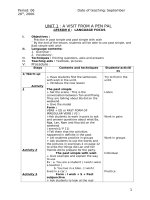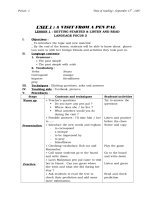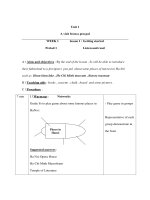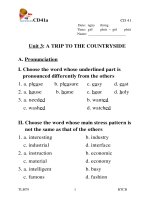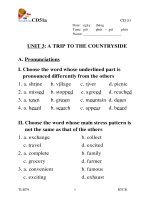AV 9 Unit 1 A visit from a pen pal 2
Bạn đang xem bản rút gọn của tài liệu. Xem và tải ngay bản đầy đủ của tài liệu tại đây (112.21 KB, 21 trang )
CD11a CD 11
Date: ngày tháng
Time: giờ phút ∼ giờ phút
Name: ______________________
UNIT 1: A VISIT FROM PEN PAL
C. Used to
Use: “used to + V” diễn tả hành động hay sự
việc xảy ra thường xuyên trong một khoảng thời gian
nào đó trong quá khứ nhưng bây giờ không còn nữa.
_ I used to like fish, but I never eat it now.
Form:
Affirmative: S + used to + V
_ Nick used to smoke.
Negative: S + did not + use to +V
_ We didn’t use to play that game.
Interrogative: Did + S + use to + V….?
_ Did you use to smoke?
TLBT9 BTCB
1
CD11b
Change the following sentences into the negative
and interrogative form
_ They used to travel to London.
They didn’t use to travel to London.
Did they use to travel to London?
1. He used to live in that city.
_____________________________________
_____________________________________
2. She used to go to school late last year.
_____________________________________
_____________________________________
3. You used to be a lazy student last year.
_____________________________________
_____________________________________
4. We started living here fifteen years ago.
_____________________________________
_____________________________________
5. Her hair is short and black.
_____________________________________
_____________________________________
TLBT9 BTCB
2
CD12a CD 12
Choose the best answer
1. When she was a child, she_________ like sweet.
a. used b. used to c. use to d. uses to
2. I used _________ a car to Dalat.
a. drive b. driving c. to drive d. to drove
3. He _________ to smoke last year.
a. doesn’t use b. didn’t used
c. didn’t use d. not use
4. She didn’t _________ play tennis last year.
a. use to b. used to c. use d. used
5. Did you _________ go fishing when you were
younger?
a. use b. used to c. use to d. used
6. Mary _________ go to school by bus.
a. used to b. uses to c. used d. uses
7. My father used to _________ English in this
school.
a. teach b. teaches c. teaching d. taught
TLBT9 BTCB
3
CD12b
D. Review the simple present tense of ordinary
verbs (ôn lại thì hiện tại đơn của động từ thường)
Use: diễn tả thói quen ở hiện tại. Thường có các
từ sau theo câu: never, seldom / rarely, sometimes /
occasionally, usually / often, always, every (day….)
Form:
Affirmative: S + V
(s/es)
+ O
(He, She, It, danh từ số ít … V
s/es
)
(I, We, You, They, danh từ số nhiều đếm được + V)
_ He washes his car every week.
Negative: S + do / does not +V
(He, She, It, danh từ số ít …. does not (doesn’t))
(I, We, You, They, danh từ số nhiều đếm được + do
not (don’t))
_ She doesn’t wash up everyday.
Interrogative: Do / Does + S + V…?
(Does + he, she, it, danh từ số ít….?)
(Do + I, you, we, they, danh từ số nhiều đếm được…?)
_ Does she go to school everyday?
TLBT9 BTCB
4
CD13a CD 13
Change the following sentences into the negative
and interrogative form
_ Bill practises speaking English everyday.
Bill doesn’t practise speaking English everyday.
Does Bill practise speaking English everyday?
1. Mary cooks everyday.
_____________________________________
_____________________________________
2. John watches TV every night.
_____________________________________
_____________________________________
3. They visit their parents every weekend.
_____________________________________
_____________________________________
4. My daughter bought that dictionary yesterday.
_____________________________________
_____________________________________
5. The man is running after the bus.
_____________________________________
_____________________________________
TLBT9 BTCB
5
CD13b
Choose the correct answer
_ She often (travels / traveled) to Dalat by car.
1. He (plays / played) football everyday.
2. David (swims / is swimming) in the pool right
now.
3. Yesterday, Lan (meets / met) John at school.
4. Last night, she (didn’t phone / doesn’t phone)
me.
5. They (don’t go / didn’t go) shopping everyday.
6. (Did / Do) you see Ann last night?
7. He (doesn’t watch / isn’t watching) TV at the
moment.
8. (Does / Is) she often go out at night?
9. He didn’t (drink / drank) much wine yesterday.
10. Does she usually (drives / drive) to Nha Trang?
11. Nancy (washed / washes) her hair twice a week.
12. He (played / plays) tennis well yesterday.
13. We all take part (in / at) different activities at
recess.
14. They are interested (in / at) literature.
TLBT9 BTCB
6
CD14a CD 14
Put the verbs in brackets into the correct form
_ She never (drink) drinks wine.
1. Nam sometimes (go) _________ to the cinema.
2. Last week, Thanh used (go) ________swimming.
3. She (get) _________ up late yesterday.
4. Hanh (study) _________ physics right now.
5. Bill (not, play) _________ football everyday.
6. He (not, play) _________ football yesterday.
7. He (not, play) _________ football at the moment.
8. _________ you often (see) _________ her?
9. _________ you (see) _________ her last night?
10. _________ you (see) _________ her at present?
11. The teacher (divide) _________ the class into
four groups yesterday.
12. Vicky (go) _________ to the cinema now.
13. Laura (paint) _________ a picture this morning.
14. I (not, have) _________ a key, but luckily
someone was there to let me in.
TLBT9 BTCB
7
CD14b
Find out the mistake from the underlines words
_ Does she goes to school by bicycle everyday?
A B C D
caâu B: go
1. She used to reading books when she was a child.
A B C D
2. I didn’t used to do homework because of my
A B C
laziness last year.
D
3. He listening to music at the moment.
A B C D
4. Mark seldom visited his grandparents every
A B
Sunday because he is very busy.
C D
5. Did they fed Lulu last night?
A B C D
6. What are you and your friends talk about?
A B C D
TLBT9 BTCB
8
CD15a CD 15
Choose the best answer
1. He used to _________ volleyball last year.
a. played b. playing c. play d. plays
2. She often _________ the Ao dai to go to work
every Friday.
a. wears b. is wearing c. wore d. wearing
3. Mary _________ at the church at present.
a. pray b. is praying c. prayed d. prays
4. John _________ every morning.
a. doesn’t jog b. didn’t jog
c. not jog d. isn’t jog
5. Unfortunately, the driver _________ the red light.
a. didn’t saw b. didn’t see
c. saw not d. not see
6. John _________ a lot of books yesterday.
a. buys b. bought c. buy d. boughts
7. They used to drink beer _________ breakfast in
England 2 years ago.
a. in b. for c. at d. on
TLBT9 BTCB
9
CD15b
Find out the mistake from the underlined words
_ John is at home last night.
A B C D
caâu A: was
1. Lan took his son to Hoan Kiem lake yesterday.
A B C D
2. He doesn’t often wrote a letter to me.
A B C D
3. Does she often washes the floor?
A B C D
4. The thief breaks the window and stole the picture
A B C D
yesterday.
5. At school, we learn a lot of different subject.
A B C D
6. Everyday, we are getting up at 6a.m and go to
A B C
school by bus.
D
TLBT9 BTCB
10
CD16a CD 16
Date: ngày tháng
Time: giờ phút ∼ giờ phút
UNIT 1: A VISIT FROM PEN PAL
E. The past simple with “wish”
(thì quá khứ đơn ở dạng ước muốn “wish”)
Form: S + wish (that) S + V
2
Với “to be”: sẽ là “were” cho tất cả các ngôi.
_ I wish she were good.
_ I wish they were not out every night.
Với động từ thường:
_ I wish I finished the work soon.
_ I wish you didn’t go to school late.
Use: diễn tả điều ước trái ngược với sự thật ở hiện
tại.
_ It is hot now. (xác đònh)
I wish it were not hot now. (phủ đònh)
_ I don’t have much money. (phủ đònh)
I wish I had much money. (xác đònh)
TLBT9 BTCB
11
CD16b
Rewrite the following sentences with the structure
“S + wish (that) S + V
2
”
_ He smokes everyday.
I wish he didn’t smoke everyday.
1. You are not friendly.
We wish________________________________
2. You don’t have a dictionary.
I wish__________________________________
3. You live very far from school.
They wish______________________________
4. He speaks English very badly.
He wishes______________________________
5. She doesn’t know many friends.
I wish__________________________________
6. It’s a pity. I don’t have a new laptop.
I wish__________________________________
7. There are many orphans in the war.
I wish_________________________________
TLBT9 BTCB
12
CD17a CB 17
Choose the correct answer
_ I wish you (were / are) taller now.
1. I wish she (studies / studied) harder now.
2. I wish he (didn’t play / doesn’t play) game now.
3. What (did / does) she often do in the evening?
4. She didn’t (live / lived) in Hanoi last year.
5. John doesn’t (visit / visits) his teacher every year.
6. They (are eating / eat) seafood right now.
7. (Do / Did) you buy a lot of flowers yesterday?
8. She used to (work / working) hard last year.
9. I wish there (were / was) many friends at the
party.
10. Did you (use to walk / used to walk) in the park
two years ago?
11. My sister (looked after / looks after) the children
when my mother was away.
12. Tim’s mother is always proud (of / with) him
because he works so hard.
TLBT9 BTCB
13
CD17b
Choose the best answer
1. I wish you ________ a longer vacation now.
a. have b. had c. has d. having
2. They ________ good friends, but now they are no
longer good friends.
a. used to be b. were
c. used to being d. used
3. We didn’t ________ to drive carefully.
a. used b. use c. uses d. using
4. Last night, I came home, cooked dinner, and
________ TV.
a. watch b. watched
c. would watch d. watching
5. Rick left class early yesterday, because he
________ a headache.
a. had b. was having
c. has d. is having
6. Mary ________ newspapers in the room right now.
a. reads b. reading
c. is reading d. was reading
TLBT9 BTCB
14
CD18a CD18
Find out the mistake from the underlined words
_ The last time I have gone to Brighton was in August.
A B C D
caâu B: went
1. You’re always tired. I wish you don’t go to bed so
A B C D
late.
2. Did you bought anything at the supermarket
A B C D
yesterday?
3. Is Jane watch TV in the room right now?
A B C D
4. What do you use to do when you felt afraid?
A B C D
5. Does she teaches English at this school every day?
A B C D
6. The United States become independent of England
A B C
in 1776.
D
TLBT9 BTCB
15
CD18b
Put the verbs in brackets into the correct form
_ I wish you (have) had your friend’s phone number.
1. You (not / have) ________ a sister.
2. When I was a child, I (draw) ________ very
badly.
3. His mother wishes he (not / be) ________ lazy.
4. There (not / be) ________ any rivers and lakes in
your hometown.
5. They (arrive) ________ Sai Gon in 1945.
6. My son (study) ________ his lessons every night.
7. Students (go) ________ to DaLat last holidays.
8. We (study) ________ a very hard lesson the day
before yesterday.
9. Tom never (be) ________ in Hanoi.
10. Oh no! Someone (steal) ________ my bag.
11. When we (drive) ________ home last night, we
saw a strange object in the sky.
12. The sun (provide) ________ us with heat and
light.
TLBT9 BTCB
16
CD19a CD 19
F. Word Form (dạng từ thích hợp)
Verbs Nouns Adjectives Adverbs Meaning
beautify beauty beautiful beautifully đẹp
care care careful carefully cẩn thận
comfort comfor
t
comfortabl
e
comfortably thoải mái
hope hope hopeful hopefully
đầy hy
vọng
reason reason reasonable reasonably
hợp lý,
khá
Qui tắc:
1. Vò trí tính từ (Adjectives)
S + to be + adj
_ She is beautiful. (beauty)
Adj + Noun
_ He is a careful driver. (care)
TLBT9 BTCB
17
(adj) (noun)
TLBT9 BTCB
18
CD19b
2. Vò trí trạng từ (adverbs)
S + V + Adv
_ He drives + carefully. (care)
S + V + O + Adv
_ He drives a car + carefully. (care)
Adv + Adj
_ He is reasonably right. (reason)
(adv) (adj)
(Anh ta hoàn toàn đúng)
Use the correct form of the words given to
complete each sentence
(cho dạng từ đúng để hoàn thành câu)
1. The room is ___________. (comfort)
2. She dances ___________. (beauty)
3. John is a ___________ man. (hope)
4. She often ___________ for everyone. (carefully)
5. Mary sings ___________. (beauty)
6. My dad drove ___________ last night. (careful)
TLBT9 BTCB
19
CD20a CD20
Choose the correct answer
_ She is (beauty / beautiful).
1. The test is (difficult / difficulty).
2. I wish I had more time to know your (beautiful /
beautifully) country better.
3. Do you (hope / hopeful) that she will pass the
coming exams?
4. He is (careful / carefully). Indeed, he always
drives a car (careful / carefully).
5. The (reason / reasonable) why he was late was
unknown.
6
*
. John is (reasonable / reasonably) intelligent.
7. Mary usually takes (care / careful) of Daisy
when her mother goes out.
8. It’s very (difficult / difficulty) to complete this
essay.
9. Her English is quite (fluent / fluently).
10. Mary is a (good / well) student.
11. He is a (beautiful / beautifully) dancer.
TLBT9 BTCB
20
CD20b
Choose the best answer
1. Her _________ made me impressed.
a. beautiful b. beauty
c. beautifully d. beautify
2. He sat on a big armchair _________.
a. comfort b. comfortable
c. comfortably d. comforting
3. Mary is _________ good.
a. reason b. reasonable
c. reasonably d. reasoned
4. Do you _________ for what I’ve said to you?
a. care b. careful
c. carefully d. careless
5. My _________ is that I can meet my father in
London next week.
a. hope b. hopeful
c. hopefully d. hopeless
6. They are very_________.
a. friend b. friendly
c. friendness d. friendless
TLBT9 BTCB
21
